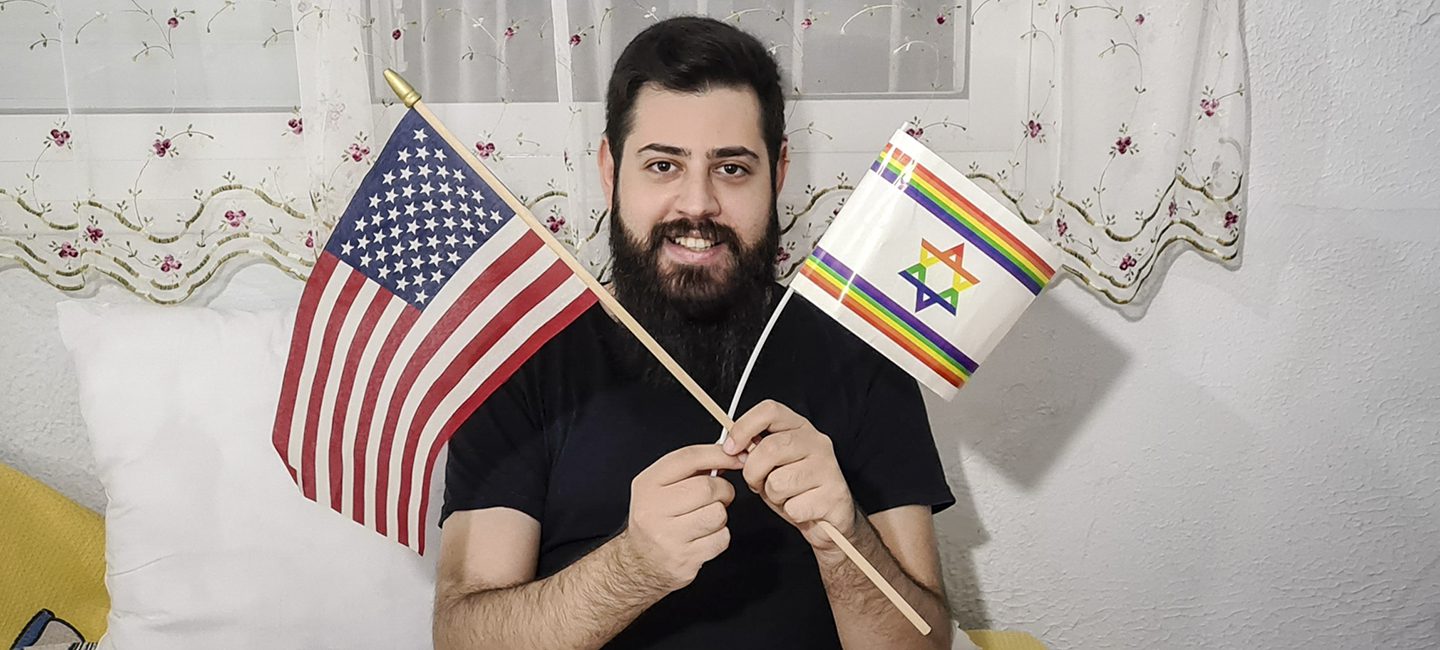 Foto cortesía de Tal Dror
Foto cortesía de Tal DrorLa orden ejecutiva de Trump ha impedido llegar a EEUU a 37.000 ganadores de la lotería de visados de diversidad para inmigrantes.
Cuando Tal Dror ganó la lotería de 2020 para obtener la tarjeta verde estadounidense, se sintió la persona más afortunada del mundo.
"Estados Unidos es uno de los únicos lugares del mundo donde no tengo que ocultar constantemente mi identidad, mis raíces, mi nacionalidad y mi religión", afirma Dror, que se identifica como gay.
¿Quiere recibir historias como ésta en su bandeja de entrada todas las semanas?
Suscríbase a nuestro boletín gratuito.

Dror creció en Ginaton, una pequeña ciudad de Israel, y trabaja como veterinario en Givatayim, cerca de Tel Aviv. El matrimonio homosexual es ilegal en Israel y La discriminación contra las personas LGBTQ es habitual. Para Dror, de 31 años, conseguir una plaza en el programa de visados de diversidad para inmigrantes de Estados Unidos significaba poder establecer un nuevo hogar en un país donde podía expresar libremente su identidad sexual.
Pero los sueños americanos de Dror fueron aplastados este año cuando el presidente Donald Trump emitió una serie de prohibiciones de inmigración que impiden efectivamente a los ganadores de la lotería de la tarjeta verde inmigrar a Estados Unidos.

"Ni siquiera tenía un plan B", dijo Tal. "Estaba tan segura de que iba a salir bien".
Hoy, las demandas presentadas por Dror y otros ganadores de la lotería de la tarjeta de residente permanente de EE.UU. se presentará ante un juez del Tribunal del Distrito de Columbia. El juez escuchará las peticiones del demandante de una medida cautelar y una orden de restricción temporal, que podrían permitir a Dror y a otras personas recibir sus visados a pesar de la prohibición.
El programa de visados de inmigración de diversidad se estableció como parte de la Ley de Inmigración de 1990 bajo la presidencia de George H. W. Bush con el objetivo de diversificar la población inmigrante en Estados Unidos. La lotería del programa recibió solicitudes de más de 14 millones de solicitantes en 2020 y eligió a casi 83.900 ganadores de países con índices históricamente bajos de inmigración a Estados Unidos. Los ganadores pueden solicitar la tarjeta verde, que proporciona la residencia permanente en Estados Unidos y una vía hacia la ciudadanía. En última instancia, hasta 50.000 de esos ganadores recibirán la tarjeta verde en un año determinado.
En 2020, el mayor El mayor número de beneficiarios de visados procedía de Egipto (5.568), Rusia (5.118), la República Democrática del Congo (4.743) e Irán (4.101).
El presidente Trump lleva tiempo criticando el programa de visados alegando que deja entrar a "algunas personas muy malas" que ocupan "puestos de trabajo de ciudadanos estadounidenses". Para optar a un visado de tarjeta verde, los solicitantes deben haber recibido al menos un título de bachillerato y demostrar que pueden mantenerse a sí mismos, no tienen antecedentes penales y gozan de buena salud. Muchos de los ganadores tienen un alto nivel de estudios pero carecen de oportunidades en sus países de origen.
En abril, Trump emitió una proclama para pausar temporalmente casi toda la inmigración, incluido el programa de visados de diversidad para inmigrantes, en un intento de proteger a los trabajadores estadounidenses durante la pandemia de coronavirus.
"Sería erróneo e injusto que los estadounidenses despedidos por el virus fueran sustituidos por nueva mano de obra inmigrante traída en avión desde el extranjero", dijo Trump en abril. "Primero debemos cuidar del trabajador estadounidense".
En junio, Trump prorrogó la orden de abril hasta finales de 2020. Las prohibiciones marcan la primera vez que el Programa de Visados de Diversidad para Inmigrantes se ha interrumpido en sus tres décadas de historia.
La proclamación cita estadísticas récord de desempleo y afirma que "a los residentes permanentes legales, una vez admitidos, se les conceden documentos de autorización de empleo de "mercado abierto", lo que les permite optar inmediatamente a casi cualquier empleo, en cualquier sector de la economía."
Pero Jorge Loweree, director de políticas del American Immigration Council, afirma que la prohibición carece de "cualquier análisis económico significativo que justifique sus afirmaciones."
Muchos economistas sugieren que los inmigrantes no quitan puestos de trabajo a los estadounidenses, ni reducen sus salarios. Más bien, la afluencia de inmigrantes contribuye a aumentar la contratación general en la economía estadounidense.
Algunos argumentan que los inmigrantes que llegan a través del programa de lotería de la tarjeta verde actúan como un "factor de atracción", fomentando más inmigrantes altamente cualificados, especialmente de aquellas comunidades infrarrepresentadas. Las investigaciones también han demostrado que una mayor diversidad entre los inmigrantes aumenta los salarios de personas nacidas en Estados Unidos.
Quienes ganaron la lotería de visados de diversidad para inmigrantes en 2020 necesitan que se les concedan visados antes del 30 de septiembre para poder emigrar a Estados Unidos. Sin embargo, el Departamento de Estado no está tramitando ningún visado, tanto por la prohibición como por la pandemia de COVID-19.
Alrededor de 37.000 de los 50.000 ganadores de la lotería podrían no terminar el proceso antes de la fecha límite de este año, el 30 de septiembre, según nuestro análisis de las estadísticas mensuales de expedición de visados de inmigrante. Aunque los ganadores de este año pueden volver a presentarse, no hay garantía de que sean seleccionados en años venideros. Dror, que había vuelto a presentarse este año, no entró en la lista de 2021.
***
Las demandas que se presentan hoy ante el Tribunal de Distrito afirman que el veto de Trump a los inmigrantes es "arbitrario y caprichoso"
"Apuntar a la visa de diversidad ha sido parte de la agenda supremacista blanca más amplia de Trump en sus políticas", dijo Laboni Hoq, abogado cooperante de Centro de Acción por la Justicia.
Hoq representa a los ganadores de la lotería de la tarjeta verde en Domingo Arreguin Gomez contra Donald J. Trump, una de las dos demandas que se escuchan hoy. Sostiene que Trump actuó fuera de su autoridad como presidente al prohibir la inmigración hasta ese punto. Si bien la Ley de Inmigración y Nacionalidad otorga cierto poder al presidente para limitar la inmigración, Hoq afirma que la prohibición va mucho más allá de ese poder.
"El Congreso es quien tiene autoridad para crear leyes de inmigración", dijo Hoq. "Crearon un complejo sistema de leyes a lo largo de décadas, y la escala a la que el presidente está intentando saltárselas no tiene precedentes. Creemos que cada pieza de esta proclamación es impugnable con éxito".
El juez Amit P. Mehta examinará las peticiones de los demandantes de un requerimiento judicial preliminar y una orden de alejamiento temporal tanto para la demanda de Hoq como para una segunda demanda de mayor envergadura, Dr. Mohammed contra Trumphoy a mediodía CST. Los telespectadores pueden acceder virtualmente al procedimiento judicial en el Sitio web del Tribunal de Distrito de Washington, D.C..
A principios de este mes, el fiscal general de Illinois, Kwame Raoul, junto con los fiscales generales de 22 estados, presentó una informe amicus curiae en apoyo de los demandantes en Gómez.
"Los inmigrantes desempeñan funciones esenciales para sostener las economías de los Estados durante la pandemia de coronavirus y después". dijo Raoul en un comunicado. "Seguiré oponiéndome a las políticas antiinmigrantes del gobierno federal que perjudican a las familias, a nuestras comunidades y a las economías de los estados".
Hoq espera que el tribunal exija hoy al menos al gobierno que tramite los visados que están en el limbo. Una vez expedidos, estos visados son válidos durante seis meses.
"No sería lo ideal, pero si la prohibición no se revoca inmediatamente, la medida alternativa que buscamos para forzar la tramitación del visado podría permitir a los demandantes esperar hasta el año que viene y venir a Estados Unidos con retraso", dijo Hoq.

Para Heidi Mehrmand, un retraso en la entrada es mejor que no entrar. Esta ciudadana estadounidense y terapeuta respiratoria de 45 años vive en California y esperaba reunirse con su hermana Mozhgan, su cuñado y su sobrino de 14 años en Estados Unidos este año.
La familia de su hermana vive en Teherán (Irán) y su sobrino, Benyamin, padece la enfermedad de Crohn, que puede tener complicaciones graves o mortales si no se trata adecuadamente. Mehrmand creía que tendría una vida mejor en Estados Unidos, donde los medicamentos para tratar la enfermedad de Crohn son mucho más fácil de conseguir que donde vive.
Mehrmand ayudó a Mozhgan a solicitar el programa de visados de diversidad para inmigrantes y le tocó la lotería de la tarjeta verde. Tenía programada una entrevista en la embajada de Estados Unidos en Abu Dhabi el 1 de abril, pero el gobierno aplazó la entrevista indefinidamente.
Cuando Mehrmand se enteró del veto migratorio de Trump, lloró durante días.
Mehrmand sigue preocupada por la familia de su hermana desde su casa en Irvine, California. Hasta que no se reúna con ellos, no podrá dormir tranquila.
"No puedo trabajar", dijo Mehrmand entre lágrimas. "Tengo el corazón roto".

Da poder a las voces de los inmigrantes
Nuestro trabajo es posible gracias a las donaciones de personas como usted. Apoye la información de alta calidad haciendo una donación deducible de impuestos hoy mismo.
